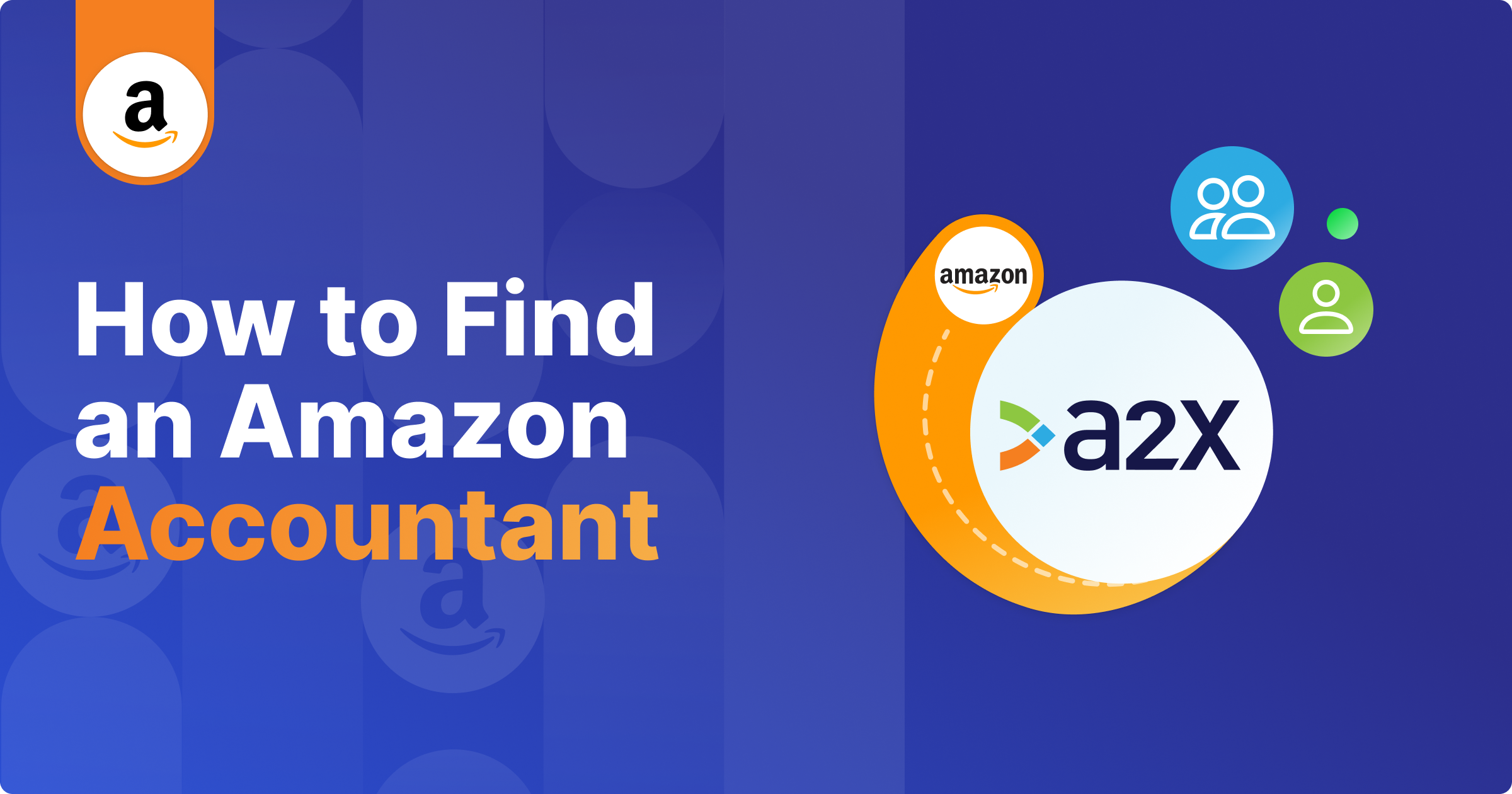How to Find an Amazon Accountant or Bookkeeper [2025 Guide]

Updated on July 3, 2025.
When you’re running an Amazon store, accurate accounting is a must.
The best way to achieve accurate Amazon accounting?
Use great accounting software for Amazon and get support from a specialist Amazon seller accountant.
This guide will help you find an Amazon accountant who’s a great fit for your business.
Key takeaways:
- The quickest and easiest way to find an Amazon accountant is via the A2X Ecommerce Accountant & Bookkeeper Directory – The A2X Directory connects Amazon sellers with certified ecommerce accountants who specialize in handling Amazon finances. Sellers can use filters to find the right accountant or opt for A2X’s “Match Me” service for a personalized recommendation.
- An Amazon seller accountant does much more than tax preparation – They provide year-round financial support, help with bookkeeping, ensure compliance with tax regulations, and manage complex transactions like Amazon settlements, FBA fees, and multi-channel sales. Their expertise can save time, increase profitability, and improve decision-making.
- Signs that it’s time to hire an Amazon accountant include expanding to new marketplaces, struggling with bookkeeping, or selling through multiple channels – As a business grows, accounting becomes more complex due to factors like foreign currencies, inventory management, and sales tax compliance. Hiring a specialized accountant ensures financial accuracy and scalability.
Looking to find an Amazon accountant right now? Visit the A2X Partner Directory. Watch this short video to learn more!
Table of Contents
Find an ecommerce accountant
The A2X Directory is a global network of expert ecommerce accountants ready to help businesses like yours.
Take me there
What does an Amazon seller accountant do?
A common misconception about accountants is that they’re only really necessary at tax time. This couldn’t be further from the truth – especially for Amazon sellers!
An accountant who specializes in working with Amazon sellers can provide year-round financial support, tailored to the unique challenges of selling on Amazon.
They can help you maintain accurate records and generate monthly reports like P&L statements and Balance Sheets (especially important if you’re seeking a loan or investment). They’ll also help you avoid costly mistakes by ensuring your business is set up and managed correctly.
An accountant with Amazon seller experience will understand that Amazon settlements are not just “sales” – they include fees, refunds, and other transactions and adjustments. They’ll help to ensure each component is properly recorded, giving you a clear view of your finances and better control over cash flow.
Ultimately, an Amazon seller accountant can help you save time, increase profitability, and make smarter business decisions.
Signs it’s time to hire an accountant for your Amazon storefront
At A2X, we believe that every ecommerce business could benefit from working with a specialist accountant.
However, as your Amazon business grows and introduces more complication, the benefits of working with an ecommerce accountant will only become greater.
Tracey Newman, Product Manager at A2X and formerly of Bean Ninjas and CloudCounting, explains:
When you’re a small ecommerce seller, selling on a single channel and in one geographic location, your accounting needs might be simple, but they can quickly grow more complex.
When you grow into a medium business, and you’re selling omni-channel and in more than one geographic location, you’ll want to better understand variable expenses that impact ecommerce business gross margin, such as warehousing, merchant fees, and pay-per-click advertising. A specialized ecommerce accountant can help you with that.
And then if you’re a large business, you’re looking to grow, acquire funding, and maybe even restructure to operate in more than one country. You’ll require a complex financial setup that allows visibility into ecommerce variable and fixed expenses, and categorization by selling channel and location. Again, you’ll need a specialized ecommerce accountant to help you with that.
Regardless of your business size or aspirations, here are a few considerations and signs that your Amazon business is becoming more complex – and it’s time to hire a specialist Amazon accountant.
You’ve been doing it yourself, but it’s taking up too much of your time
Getting behind in your bookkeeping can cause a number of issues for Amazon sellers, such as inaccurate financial reports, missed tax deadlines (leading to penalties), cash flow problems due to unrecognized expenses, challenges in managing inventory effectively, difficulty in making informed business decisions, and potential issues with compliance audits.
If you’re doing your own Amazon accounting and bookkeeping, but it’s just taking too much of your time, and/or you’ve fallen behind, then it’s time to look for help.
You sell (or want to sell) on other Amazon marketplaces
Selling on other Amazon marketplaces brings with it expanded reach and opportunities – but also a cluster of accounting complications.
From multiple currencies, to tax requirements, your books just went from beginner to advanced. Compliance is complex, and not being compliant is a huge business risk. Hire an accountant to help you understand where, when, and how much tax you should be collecting, remitting, and reporting.
You’re navigating Amazon FBA
Amazon FBA is a fantastic tool for sellers to outsource their deliveries. However, using Amazon FBA will introduce a suite of new fees for sellers to reconcile (and potentially extend their tax obligations).
Hire an accountant who has experience working with Amazon FBA sellers – they’ll be able to steer your Amazon FBA business in the right financial direction.
You sell (or want to sell) on channels other than Amazon (e.g., Shopify, eBay, etc.)
While every new sales channel brings a potential new group of viable customers, it also brings its own set of transaction types, payment processing systems, and other factors that can complicate bookkeeping. An accountant who has worked with multi-channel sellers can help make sure you’ve got all your financial bases covered.
Why working with a specialist Amazon accountant is important
Imagine dispatching $12,000 worth of inventory to Amazon, only to have it lost not once, but twice. One business owner in the wellness niche faced this stressful situation. Despite the lost inventory and an unnerving 11-day account suspension, her business not only survived but also prospered, later being sold for a competitive price.
The secret? A solid accounting strategy that was crafted by her expert ecommerce bookkeepers.
Stories like this aren’t unique among Amazon sellers. They highlight a crucial lesson for all business owners: a strategic Amazon accountant or bookkeeper does more than just balance books. They’re an essential partner in navigating the peaks and valleys of ecommerce.
As mentioned, not all accountants have the level of expertise and experience required to do Amazon accounting properly.
An accountant who specializes in working with Amazon sellers will be able to understand and manage important aspects of Amazon accounting, including:
- Bulk settlements – Amazon pays its sellers bi-weekly, lumping multiple days of sales into one settlement. The settlement number includes various elements such as Amazon fees, sales tax, shipping costs, and returns. Understanding these components provides an accurate view of your income and assists in reconciling your books.
- Month-end crossover – Because sellers are paid biweekly, some settlements span multiple months (e.g., September 19 to October 3). In cases like these, it’s essential to allocate sales to their respective months for an accurate monthly sales snapshot.
- Hundreds of fee types – Amazon has many different types of fees to account for – and it’s not just the sheer amount of fees, but also all the different types of fees that can throw you for a loop. Understanding and accounting for these fees is crucial for accurate profit calculations.
- Amazon reserve balances – Amazon may hold back a certain amount from your bi-weekly settlements, acting as a form of security deposit. If you’re not aware of or prepared for this reserve, it can create a sudden, unexpected strain on your cash flow. For a business that’s scaling or operating with tight margins, this can be particularly challenging. Your Amazon accountant can help you plan for this financial nuance, ensuring it doesn’t disrupt your ongoing operations or long-term planning.
- Choosing the right report in Amazon Seller Central – When you dive into Amazon Seller Central, you’ll find a variety of reports, but not all of these reports will serve your accounting needs just right. While the Amazon Settlement V2 file report may seem daunting with its wealth of details, it’s the one you want. It’s comprehensive and gives you the full picture needed for accurate bookkeeping. The simpler reports seem tempting, but they’ll only provide an overview, won’t align perfectly with your Amazon settlement, and will miss the granular details necessary for precise bookkeeping. It’s essential to go the extra mile with the right report instead of taking shortcuts that could lead to discrepancies.
- A lot of transaction data – The Amazon Settlement V2 file Report is very data-rich and could even cause computer lag to download. Then, once you have it, there’s the task of making sense of all that raw information. Navigating this data can be time-consuming for those not specialized in ecommerce, whether generalist accountants or DIY bookkeepers. On the other hand, an experienced ecommerce accountant uses A2X to extract and summarize this data.
- Reviewing remitted and collected sales tax – While Amazon may collect and remit sales tax for you under Marketplace Facilitator obligations, it’s still your responsibility to make sure the numbers are accurate. Don’t forget that tax authorities have a clearer picture than ever, so be diligent to avoid any issues like audits.
- International transactions – Going global opens up new markets and revenue streams for Amazon sellers but also brings its own set of headaches. International sellers will deal with accounting complexities such as multiple currencies, foreign bank accounts (or alternatives such as AirWallex), foreign exchange rates, and cross-border tax regulations, for example, VAT in the EU and UK.
- Digital expenditure – Ecommerce businesses have their own set of unique online costs. Apart from the obvious Amazon selling plan fees, there are costs related to online advertising campaigns, referral fees for driving traffic, and even software integrations, which a brick-and-mortar store might not encounter.
There’s a myriad of intricacies in Amazon bookkeeping and accounting that make it challenging without the right expertise. Generalist accountants, given their broad clientele, might only handle a few ecommerce businesses and may not be fully acquainted with the nuances of Amazon.
Alternatively, an accountant well-versed with Amazon is already in tune with these specificities. Beyond just getting the numbers right, they can dig into your financials to spot opportunities or signal potential pitfalls.
Think of a specialized Amazon accountant as a trusted advisor who can help you understand where your Amazon business stands. They could pinpoint your top-selling products, suggest ways to boost profitability, and advise on managing cash flows to appeal to investors or potential buyers.
Checklist: What to look for when evaluating accountants for your Amazon storefront
Now that you know the benefits of hiring a specialist Amazon accountant or bookkeeper, and when to look for one, let’s explore how you go about finding your perfect match.
Your first step is to make sure they have the expertise you need to properly manage your Amazon accounting.
AIS Solutions explains why expertise is so important for ecommerce businesses:
Make sure the accountant or bookkeeper you choose prioritizes the accurate categorization of data from your selling platforms in your accounting software. This is key to ensuring your financial reports are reliable. Financial reports provide valuable insights into the performance of your ecommerce business. They help you track revenue, expenses, profitability, and other key metrics over time, allowing you to identify trends, strengths, and areas for improvement. By analyzing financial reports, you will be able to make informed decisions about pricing, marketing strategies, inventory management, expansion plans, and more. These decisions can have a significant impact on the success and growth of your ecommerce business.
Stay compliant! Ecommerce businesses are subject to various tax regulations, including sales tax for different jurisdictions. Ensure your accountant or bookkeeper is well-versed in ecommerce tax laws and helps you stay compliant to avoid penalties or legal issues.
Check for expertise by asking the following questions.
Are they ecommerce-savvy? Do they have extensive, hands-on experience working with other Amazon businesses and ecommerce clients?
Do they have an-depth knowledge of Amazon? Do they understand all aspects of Amazon selling, including FBA and the various fees that come with it?
Are they familiar with ecommerce tools? Ask about the integrations they’re comfortable with, especially when it comes to accounting, CRM, and inventory management software.
Do they take a proactive appraoch? You want someone who takes the initiative, from conducting regular financial reviews to foreseeing challenges and providing strategic advice.
Can they provide insight into ecommerce costs? Your accountant should be able to guide you through the costs associated with ecommerce, like PPC advertising, warehousing, and seller fees.
Do they understand ecommerce-specific metrics? Can they explain how metrics like average order value, conversion rate, and customer lifetime value impact your business?
Do they have relevant certifications? Check their website and/or about their certifications (e.g., for A2X, QuickBooks, Xero, etc.).
Do they have sales tax/VAT expertise? With global selling comes complex tax obligations. Make sure they’re up to the task or have a network of experts to help out.
Do they understand inventory management? They should be able to navigate the complexities of inventory, from calculating the cost of goods sold to understanding dropshipping and third-party logistics.
Are they capable of helping you handle multiple sales channels? If you’re selling on multiple platforms, your accountant should be able to manage the finances seamlessly across all channels.
Do they communicate openly and frequently? Look for someone who wants regular communication; it shows they’re invested in your business and can offer valuable advice.
Remember: You’re not just hiring someone to crunch numbers. You’re bringing on a partner who will help navigate the complexities of ecommerce, ensuring your business isn’t just surviving, but thriving.
How to find an Amazon accountant using the A2X Directory
You could Google “Amazon accountant near me” and click through a few options.
Or, there’s an easier way: The A2X Partner Directory.
A2X Partners consist of accounting and bookkeeping firms that are:
- Proven experts in ecommerce accounting and bookkeeping
- Certified to operate A2X software
Think of the A2X Directory as a user-friendly “phone book” exclusively listing top-tier ecommerce accountants and bookkeepers.
You have two options for finding the perfect ecommerce accountant or bookkeeper through the A2X Directory: 1) Utilize filters to narrow down your search, or 2) let the A2X team pair you with a suitable match.
- Use filters in the A2X Directory
Navigate to the A2X Directory and scroll down. On the left, you will find a series of dropdown menus where you can input details about your business, such as your sales channel(s) and the services you need.
The logos on the right side of the screen will update in real time based on your selections.
To learn more about each firm, click on their logo to access their Partner Page, which includes more details about their services, reviews, etc. If you wish to contact a specific firm, click on the orange ‘Contact’ button.
- Get matched
Alternatively, you can allow A2X to connect you with a Certified A2X Partner who we think will best meet your requirements.
Just scroll down in the A2X Directory and click on the ‘Get matched’ button, or directly access our “Match Me” form.
Once you land on the “Match Me” form, complete the form with your business details.
What happens next?
After an ecommerce business submits the “Match Me” form, the A2X team will look to pair them with a partner who fits the specified criteria.
The ecommerce business can anticipate contact from the assigned accountant or bookkeeper within 48 hours.
Additionally, they will receive follow-up communication from the A2X Directory Coordinator to confirm satisfaction with their match.
Ready to find an Amazon accountant? Go to the A2X Partner Directory!
Find an ecommerce accountant
The A2X Directory is a global network of expert ecommerce accountants ready to help businesses like yours.
Take me there



